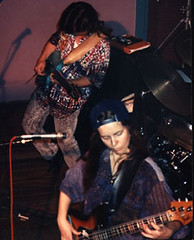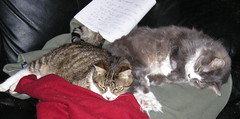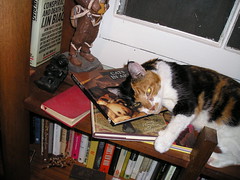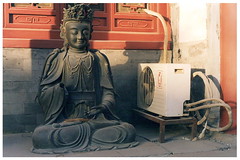We're using a difficult book in my Chinese class - when they say "Gaoji Jiaocheng," they're not kidding. The book is full of complicated, academic language which at times falls into a literary Chinese style. It can take me a good hour to get through a paragraph - and that's if the paragraph is short.
I'm not very good with characters, actually. They don't stick well in my head, and I don't spend the study time necessary for them to do so. But a year or so ago I accepted that I was not going to be the superstar Chinese student. I work full-time and I have other things I do after work competing for the hours I have left. Besides, there are people in this class who have way more experience with the language than I do. It's the most advanced class offered at the university extension program, so a lot of pretty advanced students enroll to review, to punch up their vocabulary, to try and recover what they've forgotten. Plus we get "heritage speakers," Chinese Americans who grew up in the language to some extent. Me, I'm just trying to not forget what I've already learned and get a little better as I go along. I didn't learn much Chinese during the six months I lived in China when I was young - just some useful phrases. And apparently I picked up a Beijing accent - once in class, my teacher used this as an example of a phrase we were supposed to learn - "My first impression of Fei Lisha (my Chinese name) is that she has a Beijing accent." I'll keep that, thank you. I like the Beijing accent. It's sort of rough and growly - when in doubt, throw an "r" sound on the end of a word. I'm not so fond of southern accents, though a lot of people like them because they sound softer. But the Chinese as spoken in Taiwan, for example, drops certain consonant sounds. "Zh" which is a retroflex "J" sound, becomes "Z," for example, and there's already a "Z" in Mandarin. In my opinion, Chinese is hard enough without eliminating consonants! A friend of mine from class, quite a good speaker - she'd lived several years in Dalian - pointed out that Taiwanese tend to open their mouths really wide and smile a lot when speaking. Beijingers, on the other hand, barely open their mouths at all. It's a great accent to mutter in. And I'm muttering a lot more in this class than I used to, because now that I'm not the superstar student (I was pretty good my first two years), I'm feeling just a bit shy.
For example, struggling through a particularly obtuse sentence in our textbook - I pretty much understand what the paragraph means, but I can't puzzle out the sentence. "Ze, that means 'standard,' doesn't it?" I ask Laoshi ("teacher").
"No - yes," snaps out Youlan.
Youlan is one of the most advanced students in the class. He's a white guy, a few years older than I am. He's studied Chinese for something like ten years. He uses a lot of literary Chinese and he also has a tendency to stutter. These factors, combined with his accent, which a former student once described as sounding like an old man in a Peking Opera, makes him somewhat difficult for most of us to understand. And at times he gets impatient, because he knows a lot more than nearly everyone in the class.
I have to admit, sometimes he pisses me off.
"Thank you very much for that explanation," I reply coldly, in English. "You've been a great help."
He doesn't mean to be an asshole, I realize. It's almost like Asberger's syndrome or something. He just can't help it. The first time he came to class, I remember him saying that he felt more comfortable around Chinese people than he did around Americans. And during our break, he goes out of his way to strike up an awkward conversation with me. His form of an apology. I try to be nice back, but I'm still feeling kind of sick and cranky.
"It means 'as for....it," Beide says to me in a low voice.
"Oh. It's a conjunction with 'er,'" I say, getting it.
Beide is a new student this quarter. Another lawyer. For some reason, we always get a lot of lawyers in Chinese class. His Chinese is excellent. He still sounds like an American when he talks - nothing like Youlan's exaggerated accent or even my Beijing inflected tones - but his pronunciation is correct and he really speaks fluently. Plus he actually seems to understand the text, one of the three students in the class, him, Youlan and a woman from Taiwan (also new, whose name I haven't learned) who does.
Some of the students would like to change our textbook, but so far, Laoshi wants us to keep at it. I can see both sides of the argument. It is ridiculously hard, with so many new words that only a few tend to stick. Plus the articles tend to be on the dry side. Chinese economic conditions are a favorite topic, and at times the ideology tends to influence the content (was the ancient pre-Zhou Dynasty Chinese peasant economy really collective? Every time we'd read the paragraph I'd remember that hilarious mural at Banpo Neolithic Village, the one with the prehistoric villagers gathered around the campfire making collective decisions in their primitive Communist society, one rosy-cheeked woman in fur raising her finger to make a point. I'm sure that's exactly how things went in Neolithic China).
On the other hand, once you finally parse one of these sentences, you really do gain insight into how the language is structured at a more sophisticated level than the typical, "How much is that beautiful porcelain tea-set?" exercise.
Besides, it's up to Laoshi. Laoshi is a few years younger than I, a graduate of Beijing Language and Culture University, and a truly excellent teacher. There's a word in Chinese, "renzhen." It means "conscientious," but for a time, whenever I thought of that concept, I could only remember "renzhen," and not its English equivalent. It's not quite the same, I guess. Laoshi is "hen renzhen." She takes her teaching seriously. It's a mission to her, to bridge the gap between cultures, to bring China to America through teaching the language, how Chinese embodies and reflects Chinese culture, what that worldview means in a larger, philosophical sense. So if Laoshi wants us to study this textbook, I say, we study this textbook. She's our teacher.
Laoshi and I made a sort of connection my first quarter of class. I'm not sure why. Maybe it was the Beijing accent. Maybe the connection continues because I've stuck with it, and pretty much any and all progress I've made in Chinese is due to her teaching. When I think about it that way, it makes sense. How rewarding it must be, to see a student start with almost no knowledge and continue to improve over time. To go from a few words and phrases to, if not fluency, at least a level of competence.
Studying Chinese is one of the best things I've ever done for myself. Given my peculiar history, I'd almost say it was necessary. Not knowing Chinese seemed to be some fundamental lack in my life, something I needed to make sense of my experiences. Studying Chinese - and returning to China - filled in a deep hole I'd barely understood I'd even had.
The first three years of class I made a trip to China every year. Always in winter, around Christmas. Anyone can tell you that December in Beijing is not the most pleasant time of year to be there, but on the other hand, it's cheap. And given that my first time in China had included living through a Beijing winter, maybe I felt some weird compulsion to repeat the experience until I finally got it right.
It's a lot easier now, of course. Buildings have central heating, for one thing. And complain about cultural imperialism all you want, there's nothing like a cup of Starbucks on a bitter, freezing winter day.
But the real difference is being able to talk to people, however imperfectly, in their own language. It's a terrible cliche, but really, language is the key that opens up the door to another culture.
I think this applies to any place, but if certain scholars can be trusted, perhaps particularly so to China. An article in the New York Times a while back (thanks to Richard for finding this in the IHT archives) talks about the differences between Chinese and Japanese, and how these differences might also reflect certain cultural distinctions as well.
Japanese uses kanji, characters that come from Chinese, and two other alphabets in addition, one for phonetic representations of Japanese words that aren't covered in kanji; the other used exclusively to represent foreign concepts and people.
Of all languages in the world, Japanese is the only one that has an entirely different set of written characters to express foreign words and names. Just seeing these characters automatically tells the Japanese that they are dealing with something or someone non-Japanese.
So foreign names, from George Bush to Saddam Hussein, are depicted in these characters, called katakana. What's more, the names of foreign citizens of Japanese ancestry are also written in this set of characters, indicating that while they may have Japanese names, they are not, well, really Japanese.
By contrast, in Chinese, no such distinction is made. There, non-Chinese names are depicted, sometimes with great difficulty, entirely in Chinese characters. Foreigners are, in effect, made Chinese.
The article goes on to consider the cultural implications of these distinctions, and what they might say about the futures of China and Japan. China, able to absorb outside influences, to "make them Chinese" may fare far better in a globalized economy and society than Japan, still protecting its island borders against outsiders.
Another scholar, Sam Crane, a professor of Asian studies at Williams College, used the Chinese tradition of Daoism to deal with his son's severe birth defects. He comments:
From the Imperial past until the beginning of the last century, any man (yes, there was gender inequality), even a 'barbarian' from outside the cultural norm, could become civilized. He could become Chinese. Mongolians and Manchurians, when they conquered and ruled China, became Chinese. It seems preposterous now that someone could change cultural identity, but the early conception of Chinese was more inclusive and accepting. So if I use a Chinese worldview to navigate my most difficult personal trials, and if I invoke the same ideas to make sense of other parts of my world, then by the oldest definition, I am Chinese.
Oddly enough, much of the ancient Chinese perspective has been abandoned by most people in contemporary China. You will not find many Taoists among the highflying young businesspeople and consumers in Shanghai today. A self-interested materialism is far more commonly encountered.
But that's OK. If I can be Chinese, then they can be American.
Of course, none of us can ever truly lose ourselves, can ever totally become something that we are not. But perhaps if more of us could lose ourselves just a little, can become a part of something we were not born to be, we'll all of us be more at home in this new world, the one we are making right now, that is always in the process of being born.












